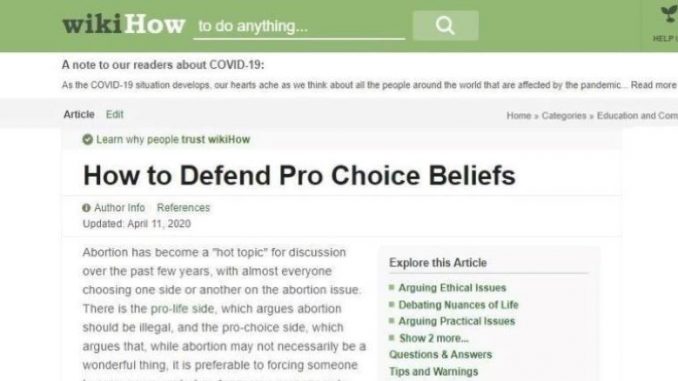
WikiHow describes itself as “an online wiki-style community consisting of an extensive database of how-to guides.” A little over a month ago, the folks there offered advice on how to argue for abortion. None of it was good.
Method #1: Arguing Ethical Issues
This method is deceptively labeled, because it’s not really about ethical issues so much as trying to defend abortion as an ethical procedure (and failing badly).
Supporting point #1: Make it clear that you aren’t arguing that abortion is a wonderful procedure full of sunshine and rainbows.
Many people raise this point. Some do claim that abortion is a good thing, but most say that while it’s not fun, it is a necessary option.
The argument is that being “pro-choice” isn’t about hating babies or wanting to coerce women to abort. But even so, that doesn’t make abortion a moral choice.
If fetuses are human beings, then the fact that women don’t like having abortions doesn’t make them less horrific. Indeed, knowing that abortion ends a life is the very reason why most people don’t have warm feelings about it.

Supporting point #2: Mention the United Nations’ position on pregnancy and torture.
According to wikiHow, “The UN has classified forcing a pregnant [woman] to continue a pregnancy against their will as torture.” However, this isn’t accurate.
The report in question actually claims that “denial of legally available health services such as abortion and post-abortion care” can cause “tremendous and lasting physical and emotional suffering.” On its face, this is hard to take seriously.
After all, why should legality matter when it comes to deciding what constitutes torture? Either something causes tremendous physical and emotional suffering or it doesn’t. Yet the UN report makes those things conditional upon what the law states, which would suggest that denial of abortion is not torturous in those places where it isn’t legally available.
What’s more, it’s amazing how the report’s author, UN Special Rapperteur Juan E. Mendez, would think that denying a woman an abortion is torture but dismembering her child isn’t. It’s particularly striking given recent evidence that a fetus may feel pain as early as 12 weeks in utero. [1]
RELATED NEWS: If Late-Term Abortion Isn’t Torture, What Is?
So not only do the wikiHow authors misstate their source, but they point to an authority that isn’t even logically consistent.
Supporting point #3: Point out double standards regarding bodily autonomy in government.
Critics contend that pro-lifers think women deserve less bodily autonomy than a corpse. Those who say this will point out that we don’t even force dead people to donate their organs, and yet the pro-life movement would force a woman to donate her uterus. Of course, this objection doesn’t hold up.
One possible result of having sex is the creation of another human being; pro-aborts implicitly acknowledge this when they euphemistically call abortion “reproductive healthcare.” And if you help to create someone, then it stands to reason that you are now responsible for meeting his or her needs.
That’s why if a man helps to create a baby, then society expects him to pay child support. This is true regardless of whether he used a condom or even if he only had sex on the condition that his partner promised to abort; if he refuses, he’ll go to jail, a place where he faces an elevated risk of violence, including murder and sexual assault.
RELATED NEWS: We Don’t Let Men Kill Their Obligations. Why Let Women?
Society accepts the idea that parents owe a certain duty of care to their children, and there’s no reason that principle should only apply following delivery. Therefore, if a woman has sex, then she tacitly consents to grant her offspring the temporary use of her uterus. In contrast, death does not imply any sort of consent to take a someone’s organs after they die.
So as you can see, it’s not about women having fewer rights than corpses. Rather, it’s that the two scenarios aren’t comparable. The only person who does have fewer rights than a corpse is a child in the womb. For while we have laws against desecrating a corpse, a pre-born baby has no legal protection.
Supporting point #4: Discuss cases in which abortion could protect the pregnant [woman] from severe harm or even death.
Most pro-lifers agree that abortion is permissible if the woman’s life is in immediate jeopardy and the embryo/fetus is too young to survive outside the womb. Here is an article I’ve written which covers the topic in-depth.
However, the case of severe harm is less clear. As we’ve already established, a parent is responsible for the safety of her child, so the fact that pregnancy may harm a pregnant woman in some way does not justify killing the fetus. He or she is a completely innocent party who played no role bringing the pregnancy about and isn’t culpable for whatever dangers it might carry. Simply put, killing an innocent person to prevent some lesser harm isn’t justifiable.
RELATED NEWS: No, Millions Of Women Won’t Die Without Abortion. Here’s Why
The point about killing the fetus to keep him or her from being miscarried is nonsensical. How is it kind to kill a dying person who isn’t even suffering before he actually dies? Nor is there any evidence to suggest that makes the mother’s experience easier. In fact, abortion denies her the extra time she would have had with her child.
The bottom line is tragic circumstances tend to make bad law. You can’t justify all abortions just because a small minority of pregnancies become life-threatening; even with pro-life laws on the books, a doctor will still be able to end a pregnancy if it’s needed to save a woman’s life.
Supporting point #5: Mention the pregnant [woman’s] future.
This point is based on selfishness: having a child will negatively impact a woman’s life, whether financially or through added stress, so forcing her to continue a pregnancy she doesn’t want isn’t ethical.
Of course, this is another bad argument. As noted above, sex is known as a reproductive act, and if it does result in the creation of a child, then that child’s parents are responsible for his or her well being. And since society doesn’t allow parents to kill off their responsibilities after delivery, there’s no reason to let them do so before hand either.
It should also be noted that having a baby doesn’t necessarily mean having to raise one. In America, couples seeking to adopt outnumber available infants, and many can be easily found online.
RELATED NEWS: Can’t Raise Your Baby? Plenty Of People Can
Airing worries about a pregnant woman’s future is usually paired with a particularly bad faith tactic, and that’s to go from saying, “Some women can’t afford a child,” to asking the pro-life person if he is supporting programs to help pro-life families. That is, of course, irrelevant.
If a firefighter who does not support social programs saves a child from a burning building, he is not responsible for paying for that child, nor is he being hypocritical because he doesn’t support social programs which are paid for by taxpayers. This is just a red herring to distract from the main issue, which is the humanity of the unborn.
Rape is brought up as well, and its a scenario in which the woman did not consent to sex and therefore did not consent to pregnancy. Research by the Guttmacher Institute (a self-described “pro-choice” organization) shows that rape survivors make up a very small fraction of those seeking abortions, which means that even if rape did justify aborting a child, it still wouldn’t justify the overwhelming majority of abortions that take place.
RELATED NEWS: Here Are 10 Child Rapists Planned Parenthood Helped
But while it’s true that a rape survivor did not ask to be pregnant, neither did her child ask to be conceived. He or she is an innocent party, and we don’t execute children for their fathers’ crimes. We also don’t execute rapists, so the idea that an innocent party should suffer a worse fate than a guilty one defies all reason. Here is an article I’ve written which looks at the situation of rape more thoroughly.
Another point they make is that consent to one thing is not necessarily consent to another. This is correct, but incomplete and ultimately misleading.
For example, giving consent to play baseball certainly doesn’t include consent to eating a ham sandwich. But let’s say I give consent to play baseball near my neighbor’s house, and while doing so, I break one of his windows.
Now, it might be true that I wasn’t trying to break his window, but I obviously knew it was a potential outcome. Can I really argue that I consented to hit the ball but didn’t consent to being held responsible for the consequences that followed? Clearly not. That wouldn’t hold up in a court and it doesn’t hold up in the abortion debate either. Sex carries the potential to create a new life, so consent to sex includes consent to what ever responsibilities follow from it.
There’s also the fact that when it comes to talking about the future, these authors don’t mention the child’s future. Don Marquis, a pro-life philosopher, has written a persuasive article defending the pro-life position based on the future of the fetus. In short, by killing a baby in the womb, that person is robbed of their future experiences. [2]
Supporting point #6: Examine whether they have a middle ground.
The simple answer here is no, there is no middle ground: abortion is wrong. Convenience, career goals, and even rape don’t justify it. If a fetus dies as the result of efforts to save her or his mother, then that is tragic but permissible; the goal in that case is not to end a life but to preserve one, with death being an unfortunate by product. However, what the abortion movement advocates for is murder, and there is no room for compromise.
RELATED NEWS: Three Times Democrats Admitted Abortion Is Killing
As an aside, I’ve been replacing the term “pregnant person” with “pregnant [woman]” throughout this article. In this point, the WikiHow authors clearly show their left-leaning bias by saying that it is “often” a woman who is pregnant. No, it is always a woman who gets pregnant. This is biology 101. Women get pregnant. Men don’t. I wouldn’t have brought this up if they didn’t specifically mention it to try and score points against pro-life people.
None of the arguments given here are persuasive or even really get at the heart of the matter. In part two, I’ll be examining their second method, in which they actually try to address this fundamental question.
[1] Derbyshire, SWG and Bockmann, JC, J Med Ethics 2020; 46: 3-6.
[2] See Don Marquis’ article, “Why Abortion is Immoral”
Want more content like this? Help us keep publishing it:
Be the first to comment